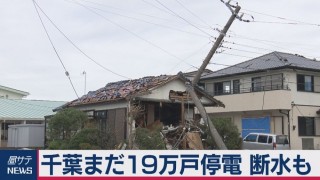Loading
Search
▼ Chiba blackouts might last another two weeks, Tepco unit says
- Category:Event
CHIBA – Tepco Power Grid Inc. said Friday that the blackouts in Chiba Prefecture caused by Typhoon Faxai could last another two weeks, leaving residents and a local mayor debilitated and frustrated.
The new timetable delivers another blow to residents deprived of air conditioners near the end of another sweltering summer. A third fatal case of suspected heat stroke was reported in the area on Friday.
As of 7 p.m. Friday, some 185,000 households were still without electricity, down from the peak of 935,000 logged on Monday and 280,000 late Thursday, according to Tokyo Electric officials.
Industry minister Isshu Sugawara had said earlier in the day the blackouts could last another week or longer.
Tepco Power Grid, a subsidiary of Tokyo Electric Power Company Holdings Inc., said the new projection was prompted by unprecedented damage in parts of Chiba. Tepco initially said Tuesday night that it would reduce the number of powerless households to 120,000 by the end of the day and have electricity fully restored on Wednesday.
Friday marked a fifth day without electricity in some areas. The typhoon made landfall near the city of Chiba early Monday and was reportedly one of the strongest to hit the Kanto region.
To prevent such a situation from repeating, experts have suggested burying the power lines, a rarity in Japan due to the high costs involved.
The slow progress by Tokyo Electric, which is being hampered by large numbers of fallen trees in mountainous areas, has left residents unnerved.
“An optimistic outlook will do no good to those affected,” Chiba Mayor Toshihito Kumagai said Thursday, voicing displeasure with Tepco’s initial projection.
“We want (Tepco) to assume the worst case scenario and share the information so all of those involved can prepare for it,” he said.
Residents now must do without air-conditioning in the late-summer heat, though temperatures have cooled in the past two days.
At a news conference Thursday morning, Tepco Power Grid engineer Kazuyuki Shiokawa offered an apology.
“We regret that our initial prediction was too optimistic,” he said.
Water supply is a problem as well.
The number of households without water stood at around 27,000 Friday morning, according to the Chiba Prefectural Government, with the blackout preventing some areas from pumping up ground water.
Even in areas where power and water were restored, water supplies were lost again as people simultaneously turned on their taps. This prompted the prefecture to ask residents to conserve supplies.
In the town of Tako, where some 4,000 households are still without running water, Self-Defense Forces personnel trucked in supplies in tankers.
The heavy damage was plain to see in some areas.
In the town of Kyonan, the typhoon smashed roof tiles and windows, and stripped entire roofs off some homes.
“The power outage is continuing and my home is a mess. I’ve never experienced something like this, and it is taxing,” said Kazuko Yamanoi, 55. “I want to take a warm bath and get a deep sleep soon.”
Masakazu Kato, a professor at Tokyo Denki University who specializes in electrical systems engineering, said it will be impossible for Tepco to restore power in just a few days, given how long it took to recover from Typhoon Jebi last year in western Japan.
“As the (Tokyo) metropolitan area rarely experiences damage from typhoons, the lack of experience likely made the company take an approach that was too optimistic,” he said.
In the wake of the March 2011 triple core meltdown at its Fukushima No. 1 plant, Tepco’s investments in power lines and other facilities fell to ¥209.7 billion in fiscal 2015, down from ¥298.4 billion in fiscal 2009.
After the enactment of a law to move power lines underground in 2016, the land ministry set out a goal of having 1,400 km of power transmission lines buried in the three years ending March 2021.
But complicating the efforts has been the exorbitant cost: It will take more than ¥500 million per kilometer to get the job done, including the relocation of gas and water mains.
- September 14, 2019
- Comment (0)
- Trackback(0)


